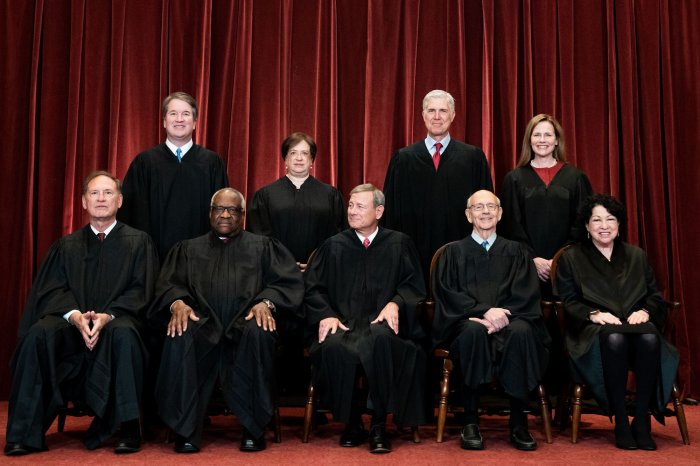1 of 7 | Texas Attorney General Ken Paxton speaks Monday at the U.S. Supreme Court in Washington, D.C. Photo by Tasos Katopodis/UPI |
License Photo
Nov. 1 (UPI) -- The U.S. Supreme Court on Monday again waded into the fight over Texas' strict abortion law that bars the procedure as soon as a fetal heartbeat is detectable, which can be as early as six weeks into pregnancy.
The high court, which narrowly decided not to block the law after it took effect last month, spent three hours Monday hearing arguments on parallel suits against "Senate Bill 8" brought by abortion providers in one case and the Justice Department in another.
At issue in Monday's arguments was not whether S.B. 8 is unconstitutional, but rather whether the plaintiffs have standing to challenge the controversial law in federal court -- S.B. 8 bars such challenges.
What has made the law so difficult to challenge is the fact that it doesn't rely on state authorities to enforce it. It effectively deputizes citizens to enforce the law by allowing them to sue those who provide abortions or people who assist that endeavor. Women who receive an abortion in Texas that violates the law cannot be sued under the law
Anyone who successfully sues a provider or accomplices under the law is entitled to what critics say is a $10,000 "bounty," plus legal fees. Successful defendants are not entitled to repayment of legal fees.
In their arguments on Monday, the opponents argued that the law violates federal court precedent.
During the hearing, two members of the court's conservative supermajority -- Justices Brett Kavanaugh and Amy Coney Barrett -- posed skeptical questions about the way S.B. 8 was written. They were among the five conservative justices who voted against blocking the law on Sept 1.
In one of the exchanges, Kavanaugh asked Texas Solicitor General Judd Stone whether the law's novel structure could lead to state legislatures crafting similar measures, which instead of targeting abortion could tap "citizen deputies" to limit religious freedom, free speech rights or arms sales.
"There's a loophole that's been exploited here," Kavanaugh noted, echoing a line of questioning voiced earlier by the liberal Justice Elena Kagan, who noted, "We would be inviting states, all 50 of them, with respect to their unpreferred constitutional rights, to try to nullify the law that this court has laid down as to the content of those rights."
Barrett, meanwhile, questioned whether the constitutional rights of those sued under S.B. 8 could ever be "fully aired" in state courts due to the way the law is written.
In its Sept. 1 decision allowing S.B. 8 to go forward, the high court said that abortion providers had raised "serious questions" about the law's constitutionality, but the fact that it uses ordinary citizens to enforce "presents a complex and novel antecedent procedural question" they did not answer.
Following the ruling, a lower court blocked S.B. 8 for about two days before an appellate court lifted the injunction.
Dale Carpenter, a constitutional law professor at Southern Methodist University, said the Supreme Court could act quickly after the hearing.
"The fact that they've called for such an expedited briefing strongly suggests that we will get some word from the court within a matter of weeks, if not days," Carpenter told the Texas Tribune. "I think probably in the month of November would be a good guess but you can't be sure."
The flurry of recent activity in the high court on the issue is a rare departure from the norm. The court has rarely weighed in on the legality of abortion since its landmark 1973 decision in Roe vs. Wade that legalized abortion nationwide.
The Supreme Court is also scheduled to hear more challenges on Dec. 1 over a Mississippi law that bars abortions after 15 weeks. It is a direct challenge to the 24-week precedent established in Roe vs. Wade.
Members of the U.S. Supreme Court pose for a group photo at the court in Washington, D.C., on Friday. Seated, from left to right, are Associate Justices Samuel Alito and Clarence Thomas, Chief Justice John Roberts and Associate Justices Stephen Breyer and Sonia Sotomayor. Standing, from left to right, are Associate Justices Brett Kavanaugh, Elena Kagan, Neil Gorsuch and Amy Coney Barrett. Pool Photo by Erin Schaff/UPI |
License Photo
















